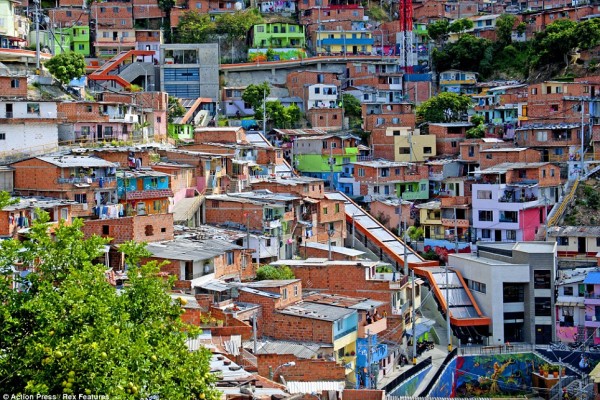Latin Americans are now wondering who will fill the power vacuum left by Chavez’s death. It is unclear as to who will claim the baton to lead the continental left, since of all the alternatives none seems able to fill El Comandante’s shoes. The potential leaders either lack Chavez’s charisma, or their countries individually play such minor roles in the regional economy, making them unable to pressure bigger economic players. Their unification under the same political flag, which includes greater political, economic, and social regional integration, is essential if their ideology of inclusive development is to remain counterweight to more centrist and rightist governments.
Chavez and Venezuela
Hugo Chavez engaged in petro-diplomacy; spending millions of dollars in making allies and promoting regional integration, while flooding Venezuela with propaganda built around his persona. The petroleum industry was an essential part of the so-called ‘Bolivarian Revolution’ since it represents 95% of the country’s exports while still maintaining a reserve of 300 billion barrels. His personal charisma combined with an understanding of historical socioeconomic struggles, allowed him to polarize Venezuela between elites and the populace, all to his advantage.
Nicolas Maduro will most likely win the upcoming elections since he was signaled by Chavez as successor and will be voted in as a last sign of solidarity of the people towards the deceased leader. However, it is unlikely that Maduro has the same cohesive support in Chavista lines. He will have to work hard to restore a precarious economy at a time in which most Latin American countries’ growth rates are booming. Although Venezuela’s growth record is fading, Chavez’s distributive policies still made it the country with the lowest Gini coefficient in Latin America. Brazil and Colombia have experienced a massive economic thrust in the last decade giving them momentum and stability despite more severe inequality issues. Every Venezuelan is now receiving a fairer share of the cake, a cake that did not grow much during Chavez’s presidency. Inflation, crime and food shortages have become ordinary in Caracas, and Nicolas Maduro is challenged with the reform of Chavez’s massive social programs to ensure their sustainability and make Venezuela economically competitive in the region again.
Contenders
Neither the presidents of Cuba, Argentina, Bolivia, Ecuador or Nicaragua can presume of both strong economic assets and charisma. The latter three lack the economic regional power that could fuel strong diplomatic activity (i.e. cannot buy allies off). Argentina is experiencing domestic tensions due to corruption in the federal government and constantly sky-rocketing inflation. Cuba, well, is Cuba. Jose Mujica from Uruguay, though sharing similar socialist ideologies, has not engaged in continental policy this far. But this does not mean no one will try, maybe Correa who learnt from Chavez that the best way to avoid spurring domestic turmoil is redirecting public and media attention to other issues.
Winner
A more moderate left is Brazil, which before Lula’s presidency had exploited its economy and natural resources in a way that would make Uncle Sam tear with joy. Now more money is flowing into social policy to close the huge inequality gap. It is another opportunity for Brazil to reassert its role as a regional leader, this time not having to compete with the pompous figure of Hugo Chavez. Brazil’s interest in the region is to reshape the continent’s economy around them, directly competing with the United States, in order to reflect the shift in the balance of powers and maybe the true end of the Monroe Doctrine.
Brazil is of the only country that has both the desire and means to develop an integrationist policy in South America. As a member of BRIC, having the 7th largest economy in the world, Brazil is looking to showcase itself internationally with events of the magnitude of the 2014 World Cup and the Olympic Games in Rio two years later. Depending on how Dilma Rousseff deals with the issues of regional integration, the diversification of Brazil’s industrial sector, and the still below average social mobility, Brazil could become a stabilizing force in Latin America. This would force extreme leftist leaders to adopt practices more associated to the center, or isolate them from the continental context.
There are institutions that Brazil could use to advance this project. They are Mercosur (Market of the South), and Unasur (Union of South American Nations) that eventually aims to emulate European Union’s integration. On the other side is ALBA, (Bolivarian Alliance for the Americas) founded by Cuba and Venezuela, encompassing leftist governments, and held together by Chavez. Its future is uncertain since one cannot yet predict whether it will continue to be important within the region or if its value will be reduced to a purely symbolic one.
The first test for Brazil are the elections in Venezuela. It is their opportunity to stand as a guarantor of democracy in the region if transparent elections take place. However, unsuccessful elections could send Venezuela into domestic turmoil and taint Brazil’s image within South America and in the eyes of the United States and European powers. In the long run, Brazil should also insist on social programs so that an economically stronger, more inclusive, and sustainable Latin America can distance itself from the legacy of being the United States backyard.
As the leaders of Latin America say their final goodbyes to Chavez, a new race for the vacant spot begins. As for the individual measures each player will take, only speculations can be made, as to whether the leaders will cooperate as they did under Chavez’s guidance. Either this or their populist, narcissistic attitudes will come to the fore in a struggle that will not benefit their socialist agenda. The Left of Latin America truly stands at crossroads. Brazil, on the contrary, has an open window to lead the continent not only economically but also socially, both abroad and domestically.
-Camilo Ucros



